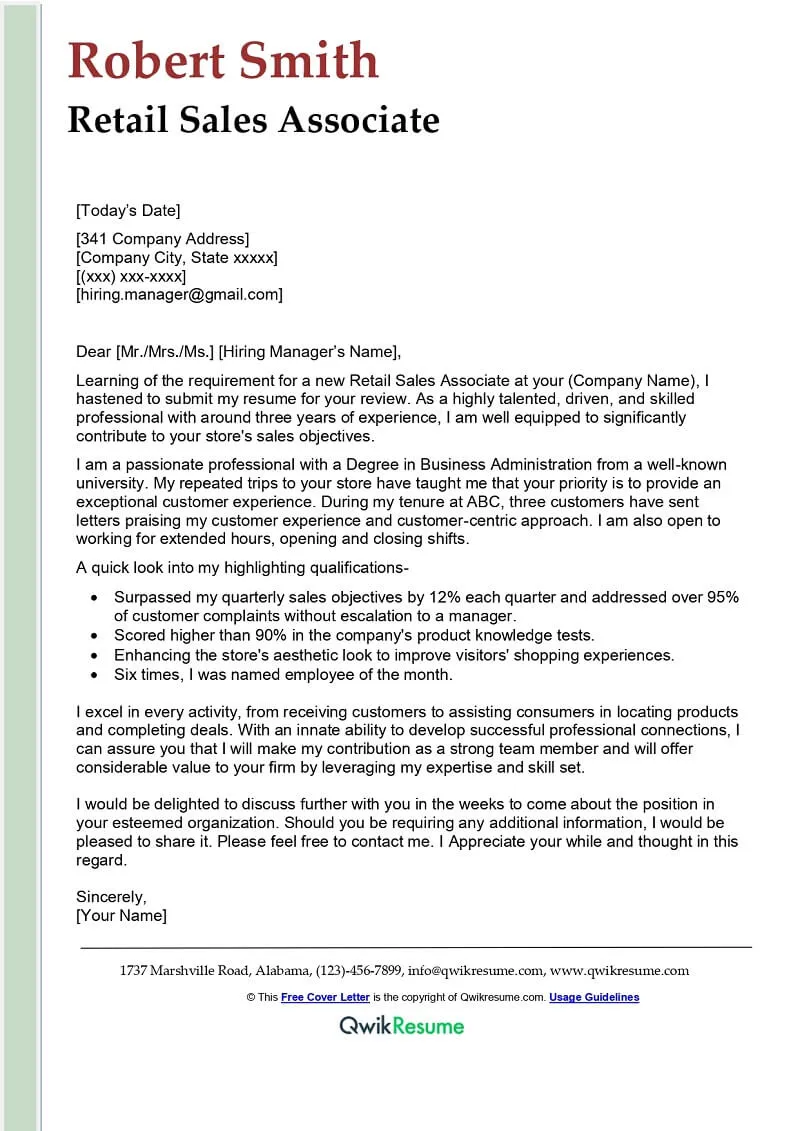Crafting a Cover Letter Retail Assistant That Impresses
A compelling cover letter is your initial opportunity to make a strong impression and secure an interview for a retail sales assistant position. It is essential for showcasing your suitability for the role and your enthusiasm for the company. This guide provides a comprehensive approach to writing a standout cover letter that highlights your skills, experience, and personality, significantly increasing your chances of landing your dream job. By following these guidelines, you will learn how to present yourself as the ideal candidate, setting you apart from the competition.
Understanding the Retail Assistant Role and Requirements
Before you begin writing, it’s crucial to understand the core responsibilities and requirements of a retail sales assistant. This role typically involves assisting customers, processing sales transactions, maintaining store appearance, and handling inventory. Key requirements often include excellent customer service skills, the ability to work in a team, and basic math skills. Researching the specific job description is paramount; identify the key skills and qualifications the employer is seeking. Tailoring your cover letter to match these requirements will demonstrate your attention to detail and genuine interest in the position.
Highlighting Relevant Skills
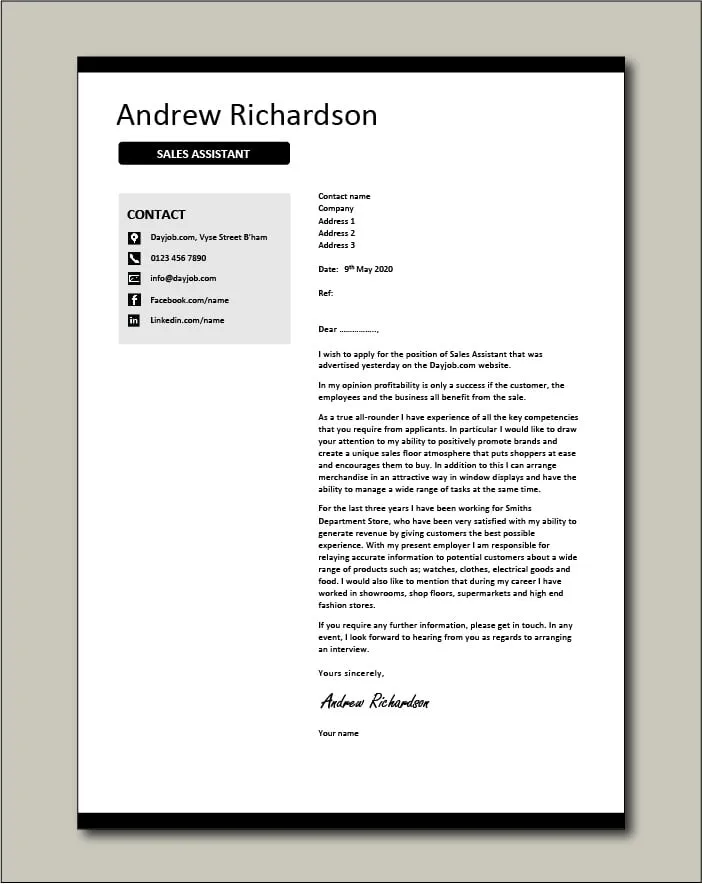
A successful retail sales assistant needs a versatile skillset. Your cover letter should emphasize the skills most relevant to the role, such as customer service, sales, and operational efficiency. Provide specific examples that illustrate how you have utilized these skills in previous roles or relevant experiences. Quantifiable achievements, like exceeding sales targets or improving customer satisfaction, are particularly impactful. Focus on the abilities that align with the job description, ensuring your cover letter directly addresses the employer’s needs.
Customer Service Excellence
Exceptional customer service is at the heart of retail success. Highlight your ability to provide friendly, efficient, and helpful service. Mention any training or experience you have in handling customer inquiries, resolving complaints, and building rapport. Demonstrate your understanding of customer needs and your commitment to creating a positive shopping experience. Providing specific examples will help to show, instead of just telling, your capabilities.
Sales and Up-selling Proficiency
Demonstrate your sales acumen by highlighting your experience in promoting products, meeting sales targets, and up-selling. Describe your techniques for identifying customer needs and suggesting appropriate products. If you have any sales awards or recognition, make sure to mention them. Emphasize your ability to drive sales and contribute to the store’s revenue, providing evidence of your sales expertise.
Cash Handling and Point of Sale (POS) Systems
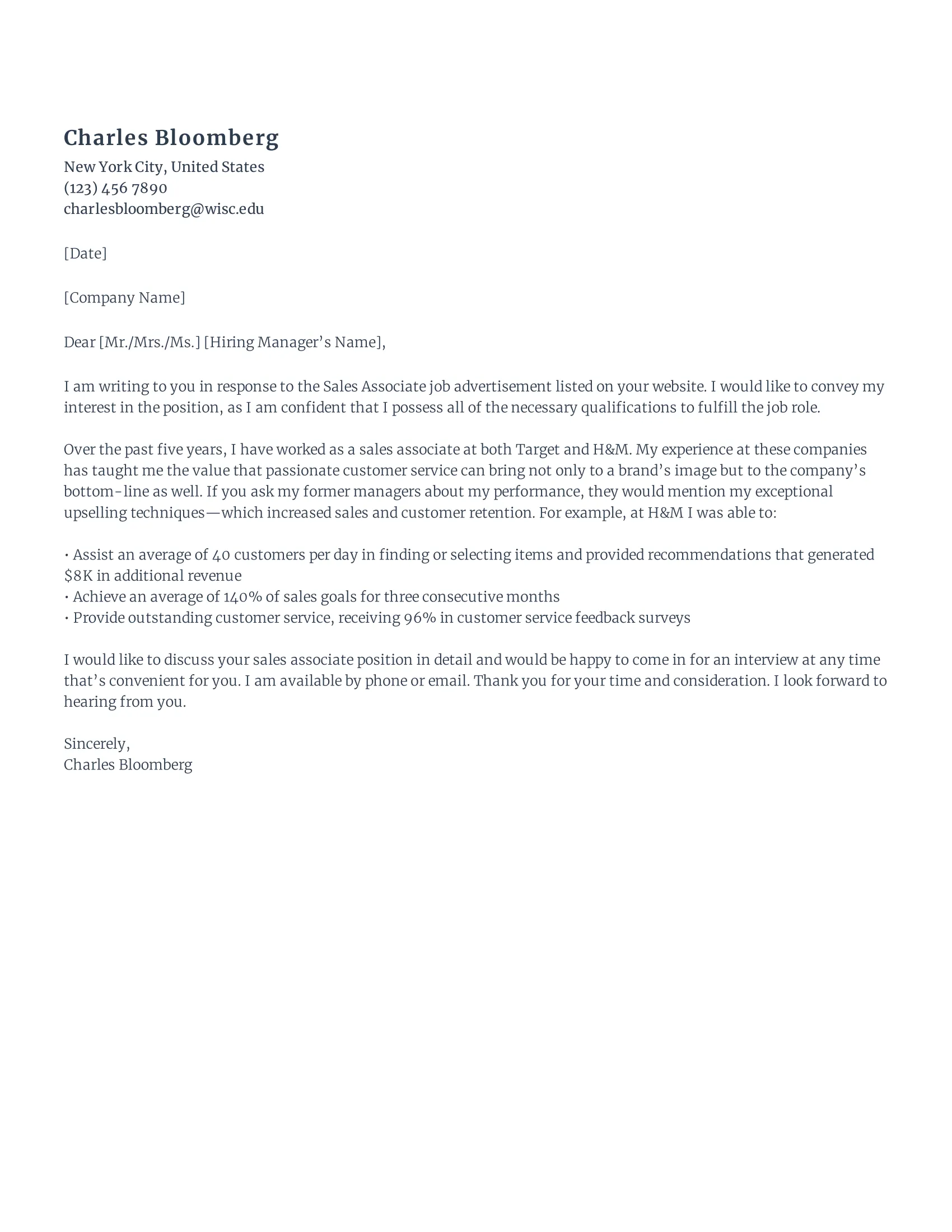
Accuracy and efficiency in handling cash and operating POS systems are critical skills. Include any experience you have with cash registers, credit card processing, and inventory management systems. Mention any training or certifications you have in these areas. Ensure you demonstrate a strong understanding of financial transactions and the ability to manage them effectively, ensuring a seamless and accurate sales process.
Showcasing Your Experience Effectively
Presenting your experience clearly and concisely is key to making a strong impression. Focus on your accomplishments rather than just listing your responsibilities. Use the STAR method (Situation, Task, Action, Result) to describe your experiences; this helps provide a structured narrative. For each role, highlight the skills you used and the outcomes you achieved, making it easy for the hiring manager to see your value. Always quantify your achievements with numbers when possible.
Structuring Your Cover Letter
A well-structured cover letter is easy to read and understand. It should follow a standard format: a strong opening, compelling body paragraphs, and a clear closing. Keep your letter concise, focusing on the most relevant information. Use clear and professional language, and ensure your letter is free of errors. A well-structured letter reflects your attention to detail and professionalism.
The Opening Paragraph: Making a Strong First Impression
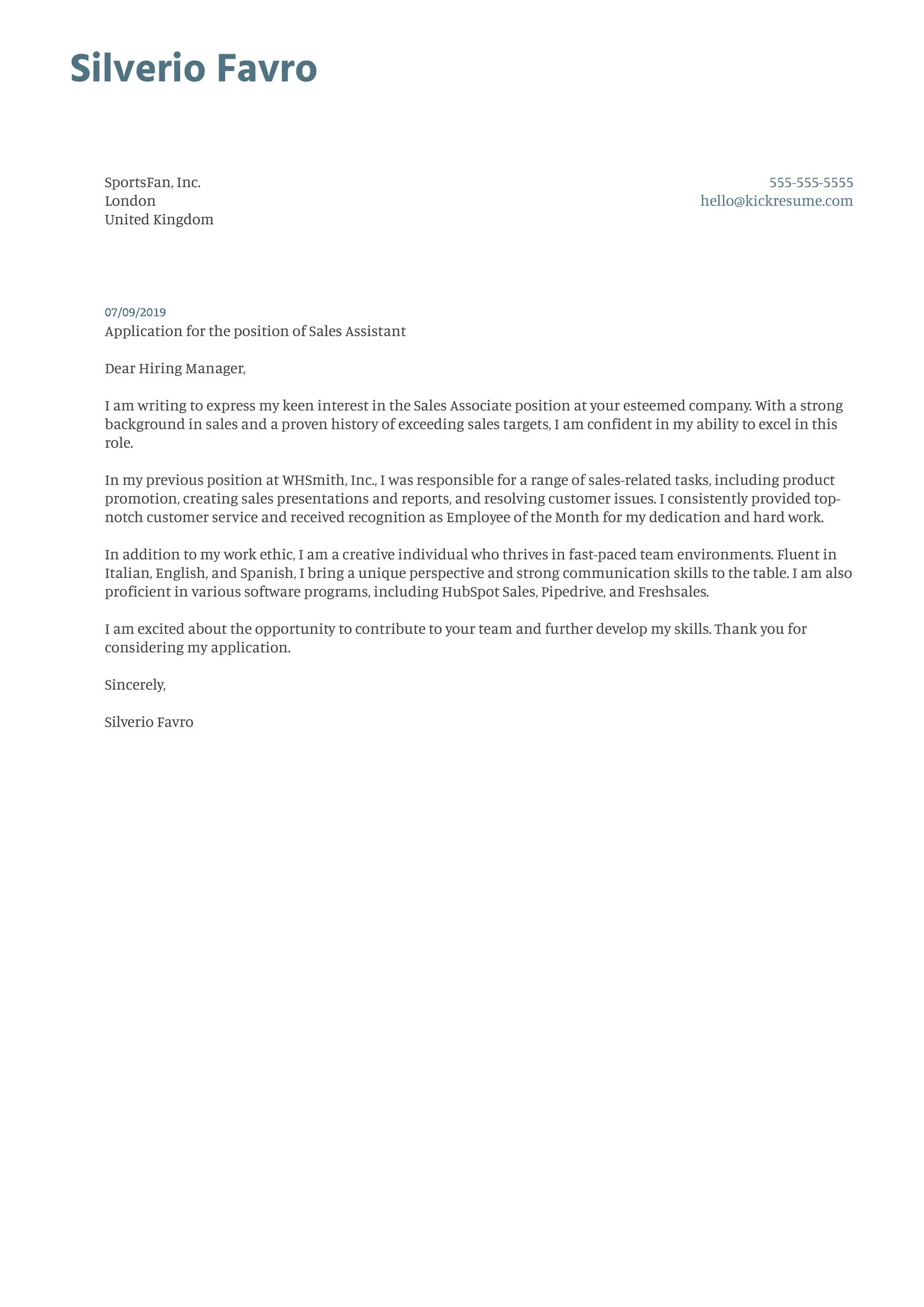
The opening paragraph sets the tone for your entire cover letter, so it’s crucial to make it count. Start by stating the position you’re applying for and where you saw the advertisement. Briefly mention why you are interested in the role and the company. Include a strong statement that captures the hiring manager’s attention, such as a key skill or a relevant achievement. Make it clear why you are an ideal candidate from the start.
Body Paragraphs: Demonstrating Value and Skills
The body paragraphs should elaborate on your skills and experience, providing specific examples to support your claims. Address the key requirements listed in the job description. Use action verbs to describe your accomplishments and quantify your results whenever possible. Each paragraph should focus on a specific skill or achievement, making it easy for the reader to understand your value. Provide a clear narrative of your capabilities and how they align with the job’s demands.
The Closing Paragraph: Call to Action
The closing paragraph should reiterate your interest in the position and the company. Thank the hiring manager for their time and consideration. Include a call to action by stating your availability for an interview and how they can contact you. Reiterate your enthusiasm and eagerness to contribute to the team. A strong closing leaves a lasting positive impression.
Tailoring Your Cover Letter
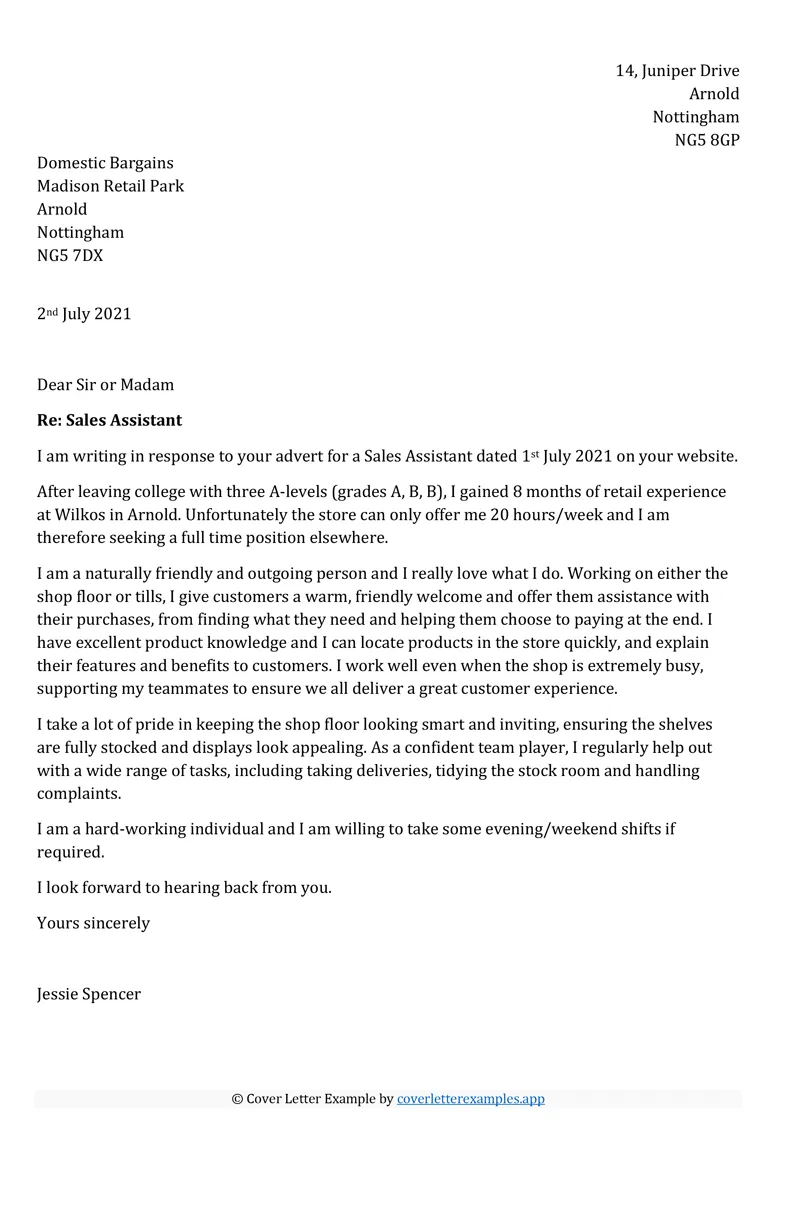
Generic cover letters rarely impress. Tailoring your letter to each specific job application is essential to demonstrate your genuine interest. Research the company and understand its values, mission, and brand. Highlight how your skills and experience align with the company’s needs. Demonstrate your understanding of the company’s culture. Tailoring your cover letter shows that you care enough to do your homework, and gives you a competitive edge.
Researching the Company
Before you start writing, conduct thorough research on the company. Visit their website, read their social media, and understand their products or services. Learn about their mission, values, and any recent news or initiatives. This research will help you tailor your cover letter to the company’s specific needs and demonstrate your genuine interest. It allows you to demonstrate that you understand the company’s culture and brand.
Customizing Your Letter for Each Application
Avoid using a generic cover letter template. Customize each letter to match the specific job description and company. Address the key requirements and highlight the skills that are most relevant. Refer to the company by name and show that you understand their business. This customization will help you stand out from other applicants and make a strong impression on the hiring manager. Customizing your letter ensures you demonstrate your genuine interest.
Keywords and Phrases to Use
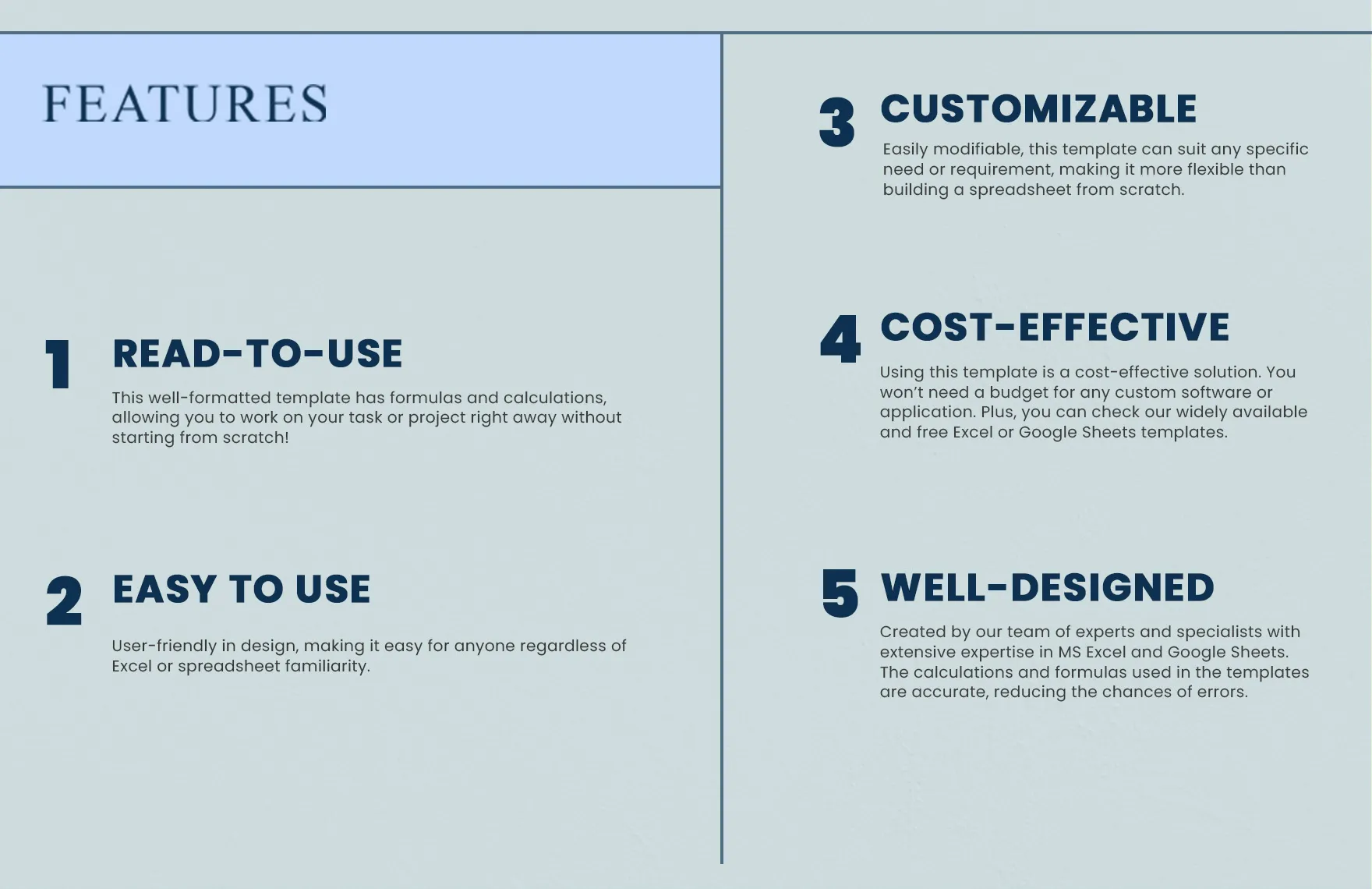
Using the right keywords and phrases can significantly improve your chances of getting noticed. Review the job description carefully and identify the key skills and requirements. Include these keywords naturally throughout your cover letter. Use action verbs to describe your accomplishments. This will help your application pass through applicant tracking systems and catch the hiring manager’s attention. Focus on keywords and phrases that directly align with the job posting.
Action Verbs to Boost Impact
Action verbs make your cover letter more dynamic and impactful. Start your sentences with strong action verbs to describe your accomplishments and responsibilities. Examples include “managed,” “achieved,” “exceeded,” “implemented,” and “assisted.” Action verbs convey confidence and highlight your ability to get things done. Using active verbs can help you to show what you accomplished, as opposed to merely describing your duties.
Formatting and Proofreading
The formatting and proofreading of your cover letter are just as important as its content. A well-formatted letter is easy to read and leaves a professional impression. Proofreading ensures that your letter is free of errors. These details demonstrate your attention to detail and commitment to quality, signaling that you will pay the same attention in the retail sales assistant role.
Formatting for Readability
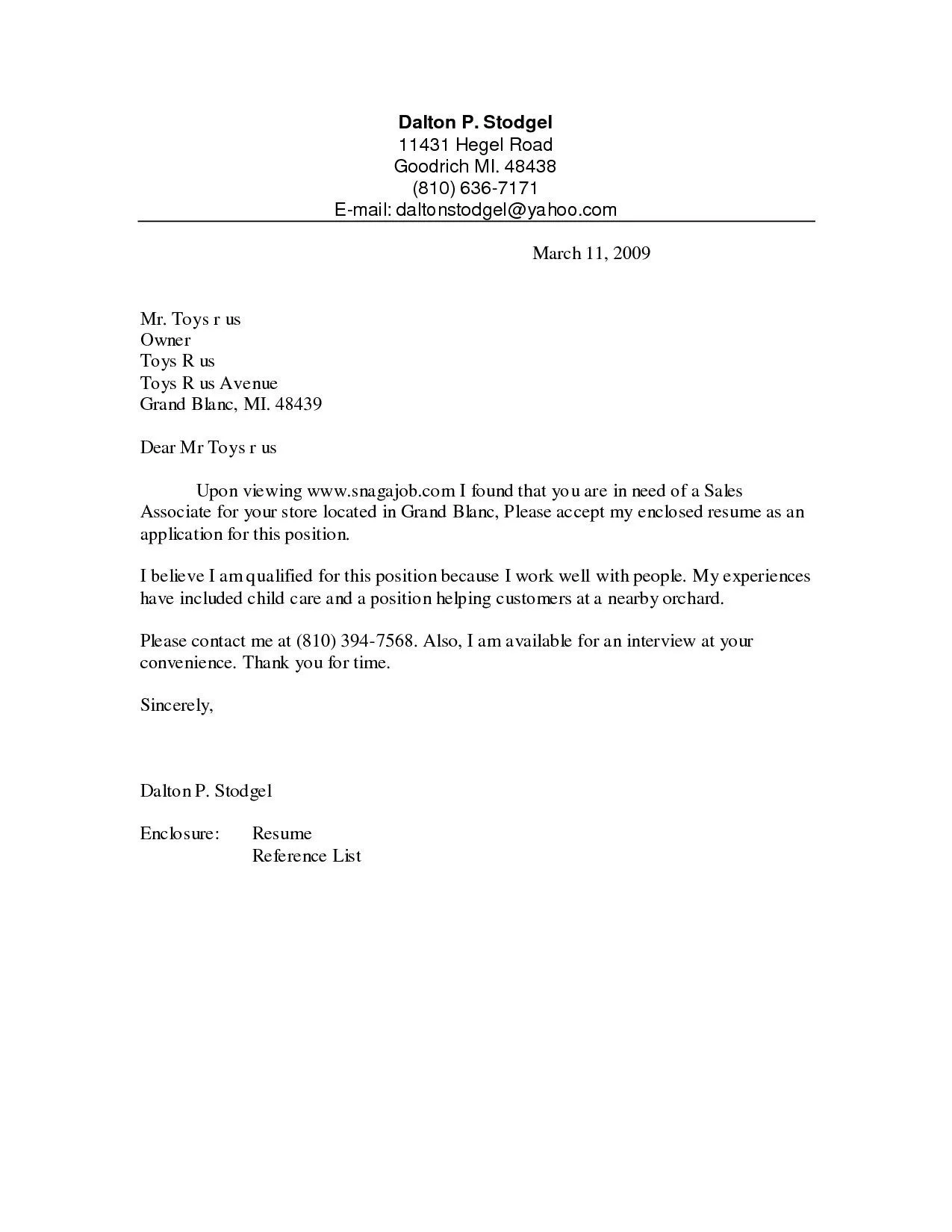
Ensure your cover letter is easy to read by using a clear font, appropriate font size, and ample white space. Use bullet points to highlight key achievements. Keep paragraphs concise and focused. A well-formatted letter is more engaging and easier for the hiring manager to read. It helps to showcase your professionalism, too.
Proofreading for Errors
Typos and grammatical errors can undermine your credibility. Carefully proofread your cover letter multiple times. Use spell-check and grammar-check tools, but don’t rely on them completely. Have a friend or family member review your letter for any errors you might have missed. A polished, error-free cover letter shows that you pay attention to detail.
Examples of Strong Cover Letter Content
Reviewing examples of strong cover letters can provide valuable insights. Analyze the structure, language, and content to understand how to effectively showcase your skills and experience. Consider the different styles and approaches, and adapt them to your own situation. This approach helps you to develop your own compelling letter. You can tailor these examples to your own experiences.
Addressing Specific Job Requirements
When reviewing examples, focus on how they address specific job requirements. Identify how they highlight the skills and qualifications that the employer is seeking. Note the language they use and how they structure their arguments to demonstrate their suitability. By understanding how others address specific requirements, you can write a more effective cover letter.
Highlighting Achievements and Quantifiable Results
Pay attention to how the examples highlight achievements and quantifiable results. Look for examples that demonstrate how the candidate exceeded expectations or contributed to the success of previous employers. Note the use of numbers and specific examples to support their claims. These examples can serve as a guide for highlighting your own accomplishments.
Common Mistakes to Avoid
Avoiding common mistakes is crucial for ensuring your cover letter makes a positive impression. Be aware of the pitfalls that can damage your application. Make sure to avoid these errors, as they can undermine your chances of success.
Generic Language and Lack of Enthusiasm
Avoid using generic language and showing a lack of enthusiasm. Generic cover letters often fail to capture the hiring manager’s attention. Your cover letter should be customized to show your genuine interest in the role. Highlight your passion for the company and the retail industry. Show enthusiasm through specific examples and a positive tone.
Typos and Grammatical Errors
Typos and grammatical errors can create a negative impression. Always proofread your cover letter carefully before submitting it. Use spell-check and grammar-check tools, but also have someone else review it. A polished, error-free cover letter reflects professionalism and attention to detail.
Following Up After Submitting Your Cover Letter
Following up after submitting your cover letter shows your continued interest and initiative. After a week or two, send a polite follow-up email to the hiring manager. Briefly reiterate your interest and inquire about the status of your application. This simple action demonstrates your eagerness and can help you stand out. Avoid being overly persistent, but a follow-up can make a positive impact.
By following these guidelines, you can create a compelling cover letter that will impress potential employers and increase your chances of securing a retail sales assistant position. Remember to tailor your letter, highlight relevant skills, and proofread carefully. Good luck with your job search!
